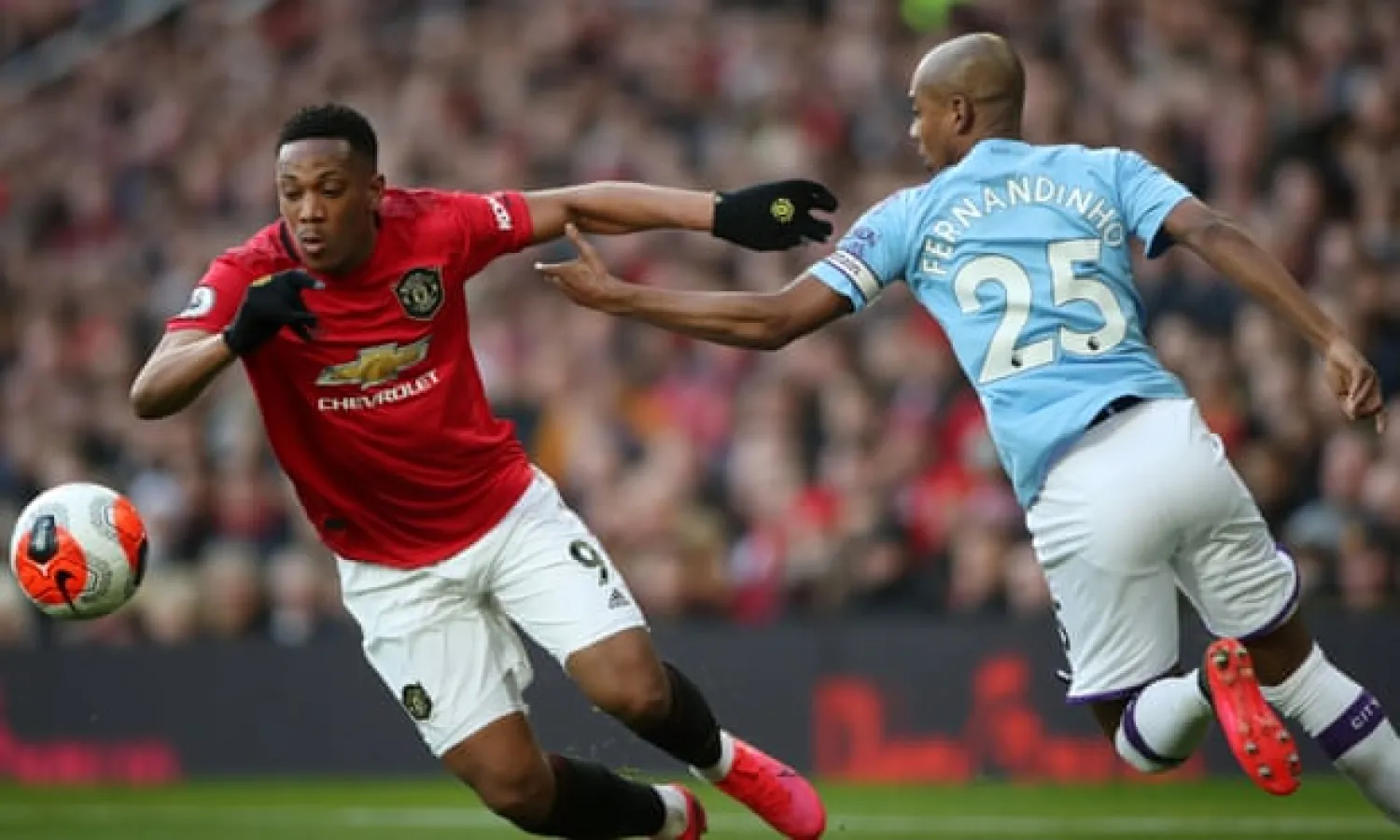To an extent it doesn’t matter. Manchester City will almost certainly finish second in the Premier League and all defeat to Manchester United did on Sunday was hasten the moment at which Liverpool will be crowned champions. City’s priorities over the next few months lie in the FA Cup, the Champions League and the court of arbitration for sport. But losing to your neighbours three times in a season can never not matter, and there is the wider issue of how City, again, found themselves outmatched by a side that sat deep and countered at pace.
It’s not enough to point out that if Ederson had not made two uncharacteristic gaffes, the game would have finished level. It’s true that the goalkeeper’s mistakes were decisive – and that he got away with another one early in the second half, allowing a backpass to roll under his foot as Anthony Martial closed in – but more significant is the fact that United created opportunity after opportunity by doing little more than have players run very quickly at the gap between Nicolás Otamendi and Oleksandr Zinchenko, a route that should also have led to a penalty before half-time.
Something has gone profoundly wrong in this regard. Modern football is about the triumph of pressing over possession and for the past two seasons, City thrived with a blend of both. But this season their gegenpressing is malfunctioning badly and the result is that the vulnerability that always existed deep below the surface has been brought into the open. The theory was always there: break the press and City could be got at – which is less a criticism than a natural consequence of a style that prioritises ball-playing over defending – but the press was extremely hard to break.
City this season have already conceded 1.5 times as many shots on fast breaks as they did in the whole of last season. It’s not just United. Liverpool, Norwich, Wolves, Newcastle, Crystal Palace, Tottenham and Leicester have all troubled City with pace on the break. Real Madrid, surely, will have taken note and will wonder whether Vinícius Júnior might be able to do to City in next week’s second leg of their Champions League last-16 tie what he did to Barcelona in the clásico.
Personnel is clearly an issue. The departure of Vincent Kompany and the injuries to Aymeric Laporte have left City with a patched together back four in which Otamendi, the least guardiolista of all City players, has started 15 league games, itself an indication not only of the absences of key players but of John Stones’s indifferent form. The puzzling recruitment of full-backs – City’s first real misstep in the market for four or five years – hasn’t helped. In addition, dropping Fernandinho back into the back four means he is no longer able to do what he does best, which is to make tactical fouls in the midfield that stymie opposition counters at source.
But something is going wrong higher up the pitch as well; City have been hit by some diminution of their organisation – of perhaps their hunger. Which is understandable enough: retaining league titles, particularly for a second time, requires a monumental effort of will, as does keeping going for the final 10 weeks of the season when there is essentially nothing left to play for in the league.
When United suddenly upped the pace midway through the first half, City had no answer. Whether it was a foul by Ilkay Gündogan on Bruno Fernandes that brought the free-kick that led to the opening goal can be debated, but what was striking was City’s reaction, protesting so vehemently that Fernandinho was booked and then distracted enough to be caught out by Fernandes’s dink over Sergio Agüero.
This seemed a micro-version of the phenomenon suffered repeatedly by Guardiola sides over the past decade of conceding two or three goals in clutches, as though once the mechanism misfires and the press is breached it can take several minutes to reset. Whether the surge was a plan is unclear, but Ole Gunnar Solskjær’s greatest managerial triumph, away to Paris Saint-Germain last season, came through similar manipulation of the tempo. It’s a risk, of course, but it may be that the best way to disrupt the smooth running of the City machine is with sudden pulses.
Opponents have seen the weaknesses, and City have lost some of their focus, which is one of the reasons teams have lifespans. To say football is cyclical seems misleading as it implies an inevitability to the process, but what is true is that teams rise and teams fall – Béla Guttmann’s three-year rule – after which, in the modern game, the tendency is for the manager to go. The great dynastic managers – Bob Paisley, Alex Ferguson, Valeriy Lobanovskyi – were masters of managing that process. After four years of Guardiola, there is need for rejuvenation, which may mean nothing more than three or four signings – at least a couple of them at centre-back.
City remain a very good side. Knockout football being what it is – and few managers can be more aware than Guardiola that the best side doesn’t necessarily triumph in Europe – they may yet do a treble of League Cup, FA Cup and Champions League, but they are not quite what they were. As City chased an equaliser in the final minutes at Old Trafford on Sunday, what was striking was how the sense was less of the inevitability of a goal than of weariness.
The Guardian Sport









